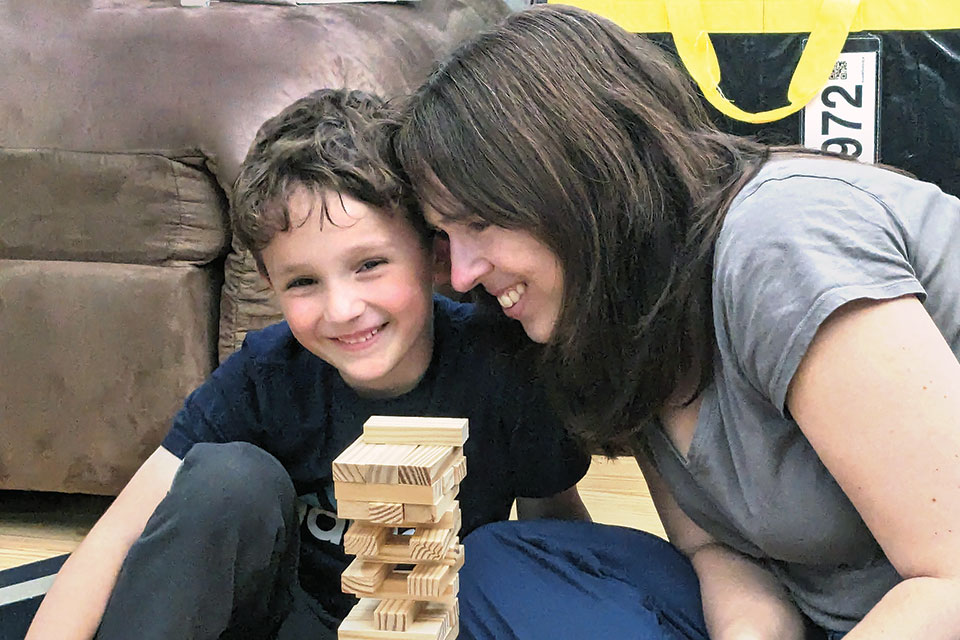Turning Points
My Sort-of Diagnosis and My Son
By Meredith Bodgas ’04

Meredith Bodgas and her son
Courtesy Meredith Bodgas
Have an “aha” moment you’d like to share in Turning Points?
Please send a query letter to gardner@brandeis.edu.
“Meredith would be fine if she stopped trying so hard to be funny.” “We need to work on Meredith calling out in class so much.” “Meredith is the rudest thing on two legs.”
These real teachers’ comments from my 1990s report cards accompanied the second-to-worst grades possible for “keeps a neat and organized desk” and “shows self-control.” Yet the rest of my grades, in subjects like reading and math, were strong — stellar, even.
Decades later, my 6-year-old was having similar struggles. Attempts to get him help led nowhere; developmental pediatricians had yearslong waitlists. But what if I got answers about myself no one had bothered to seek when I was young? Could that help me help my son?
I scheduled a full neuropsychological evaluation for myself — there was no waitlist. The first appointment started with questions about my childhood. Yes, I struggled to keep friends. No, I didn’t immediately realize when other kids didn’t want to play with me. Yes, I always had a strong sense of justice. I’d talk back to authority figures if I thought they weren’t being fair.
On to adult life. How did I deal with changes of plans? Not well, I explained. Sometimes I’d burst into tears if a dish I ordered at a restaurant, carefully selected from the online menu days earlier, wasn’t available.
The neuropsychologist feverishly typed notes.
A few days later, I took a two-and-a-half-hour exam. I had to repeat back a string of 16 words that seemed unrelated (I later learned they were related). I had to identify illustrations of everyday objects (I couldn’t remember the word for tripod). I was asked questions you’d hear on “Are You Smarter Than a Fifth Grader”: What’s the circumference of Earth? Who created Sherlock Holmes?
Then came an exercise with shapes. I had to arrange arrows and spirals in trapezoids and hexagons without overlapping them. I couldn’t. I felt like a restaurant had run out of my order. I burst into tears.
By the exam’s end, I was completely exhausted.
A few weeks later came the big reveal. “You have right frontal parietal dysfunction,” the neuropsychologist said. “Your visuospatial abilities are in the bottom 3% for people your age with your education. Coordination and sensitivity can be affected, too.”
I felt so stupid but so relieved. Finally, an explanation for why I was a terrible driver. Why I’d get lost coming back from a restaurant bathroom. Why a tap on the shoulder that wouldn’t faze most people hurts me.
What causes right frontal parietal dysfunction? “It could be associated with autism,” the doctor said. “I’m recommending you get further testing.”
Autism? I don’t have autism. I’m so social. I have so many friends ... now. I make eye contact ... if I have to. I understand nonverbal cues ... I think.
I agreed to more appointments. The process repeated: a one-hour interview, a multihour test (filmed this time) and a big-reveal meeting.
Apparently, I “stimmed,” rubbed my hands together, during the test. I rocked, too, another autism sign. I mentioned that when I was a child, after I noticed I didn’t get invited to many birthday parties, I studied the better-liked children. I saw they talked less and had smaller reactions when things didn’t go their way. I’d made an effort to be more like them.
At the big reveal, the psychiatrist said, “Your skills are too good. You don’t meet the criteria for an autism spectrum disorders diagnosis. But you have traits of subclinical ASD. If you’d sought an autism diagnosis as a kid, you probably would’ve gotten one.”
It was too late for me, but it wasn’t too late for my son. We got him on another waitlist for a developmental pediatrician. This time, I mentioned my own sort-of diagnosis. In a matter of weeks, he had an appointment and, soon, a diagnosis: autism.
We have a long road ahead with therapies. But knowing my test results has made it easier to do for my son what I wish had been done for me, like giving him space to calm down instead of scolding him for his lack of control.
Another thing: I’ve realized my strong interest in addressing injustices — a characteristic that led me to enroll at Brandeis — might have been an autism trait all along. If I pass that along to my son, I’ll be more than proud.
Meredith Bodgas, a New York Times-published essayist and former editor-in-chief of Working Mother magazine, helps students with their college essays. She can be reached at mereditheditsessays@gmail.com.